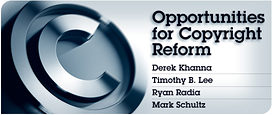Libertarians love to argue about whether copyrights are better conceived of as a kind of property right or as a coercive regulatory scheme. The question is fun to argue about, but it’s also something of a distraction. That’s because the recent changes to copyright law that Derek Khanna and others have been criticizing aren’t defensible even if we grant Mark Schultz’s premise that copyright protections are just another kind of property right.
The asset seizure powers I explored in my essay last week are an obvious example. Libertarians have long regarded the government’s power of civil asset forfeiture a major threat to secure property rights. We should be just as outraged by the use of this power to enforce copyright laws as we are when it’s used to enforce drug laws.
Radia makes a plausible argument that copyright protections are not a government subsidy to authors. He’s right that when Congress establishes a copyright system, it doesn’t confer benefits on any specific person. Rather, it sets up a system where everyone has an equal opportunity to benefit by producing creative works that consumers wish to purchase. The market, not the government, decides who benefits.
But it’s much harder to make this type of argument for retroactively extending copyright protections on already-existing works. Retroactive extensions are not an open invitation for anyone to create new works and reap the benefits. Rather, they effectively transfer wealth from the general public to particular individuals who hold the copyrights for extant works. It’s hard to see how this kind of rent-seeking is consistent with free-market principles.
The comparison of copyright protection to other forms of property also underscores the need for orphan works reform. Property law has several legal doctrines, including those of adverse possession and abandonment, that ensure that real and personal property do not fall into a state of legal limbo where no one has the right to use them.
Copyright once had a similar set of rules. To get copyright protection before 1976, you had to print a copyright notice on the work, register the work with the Copyright Office, and renew the copyright after a fixed period of time. These formalities helped to ensure that copyright holders could be found easily. If you didn’t take these steps, the works would fall into the public domain so that others could use them.
Unfortunately, Congress dismantled that system. As a result we now have an “orphan works” problem, in which thousands of copyrighted works sit idle because no one knows who owns their copyrights. We ought to make the copyright system more like traditional property rights by creating a process where unused copyrights become available for use by the public. My first choice would be to re-institute the so-called formalities, but establishing an orphan works defense to copyright infringement would be another reasonable option.
Schultz’s analogy between copyright protection and traditional property rights is also unkind to the anti-circumvention provisions of the Digital Millennium Copyright Act. Digital rights management technology is often characterized as the digital equivalent of physical locks. But the DMCA is far more radical than laws governing traditional locks. In most states lock picking is only illegal if it’s done for an unlawful purpose. Picking the lock to your own house or car, for example, isn’t illegal. In contrast, the DMCA makes DRM circumvention flatly illegal—even if the underlying purpose of the circumvention is completely legal—unless the use has been approved by federal regulators.
Moreover, the DMCA criminalizes the creation and distribution of “circumvention tools.” That’s like making it a federal felony to manufacture or distribute lock-picking tools. Yet locksmithing is a legitimate profession. Practicing its digital equivalent is a felony.
So I’m happy to accept Mark Schultz’s argument that copyright can be usefully conceived as a form of property right. I hope he’ll join me in advocating reforms that would make our dysfunctional system work more like the traditional property system.

